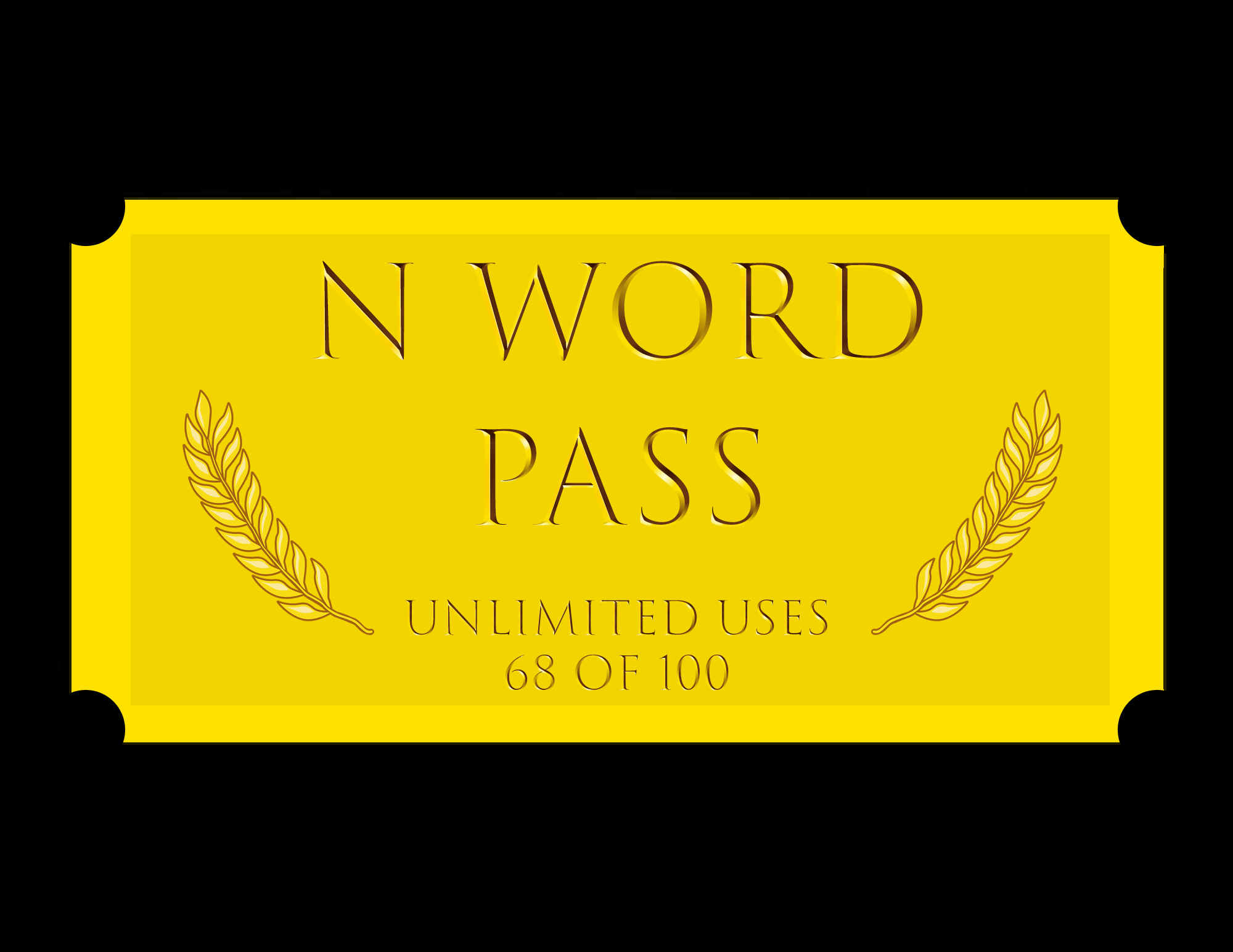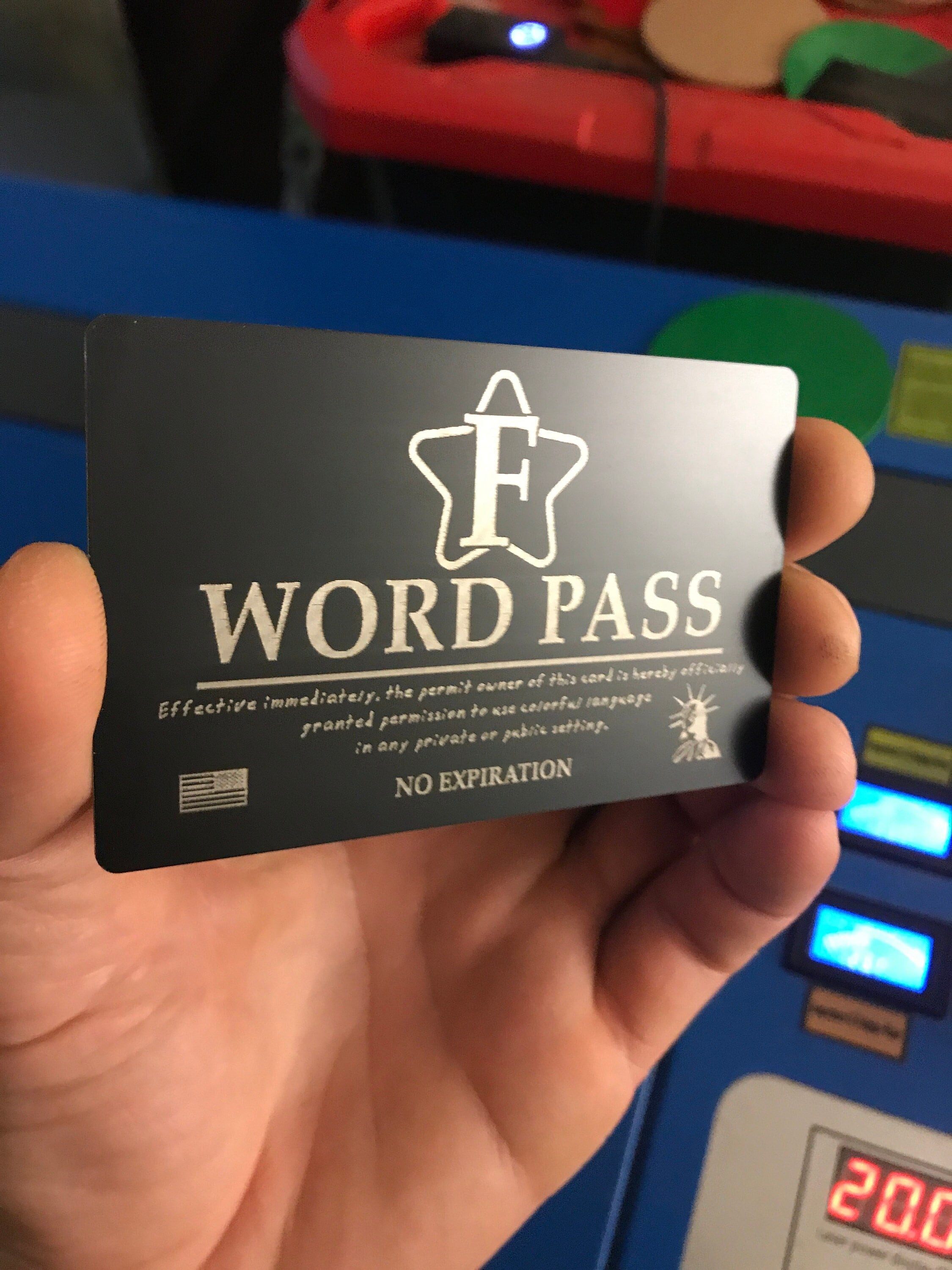Let me drop a bomb on you right off the bat—n word pass is one of the most debated topics in modern language. It’s not just about words; it’s about history, power dynamics, and societal norms. If you’ve ever wondered why this phrase exists or what it means, you’re in the right place. We’re diving headfirst into the murky waters of linguistic politics, cultural sensitivity, and everything in between.
You might’ve heard people talk about the “n word pass” in movies, music, or even casual conversations. Some folks claim they have it while others think no one should ever say the n-word at all. So, what exactly is this pass? Is it real? And more importantly, does it matter? Let’s break it down.
This article isn’t just another surface-level discussion. We’re going deep—like really deep—into the roots of this controversial topic. By the time you finish reading, you’ll have a clearer understanding of its implications, how it’s used, and whether or not it’s something worth fighting over.
Read also:Minecraft Cupcakes The Ultimate Sweet Adventure For Your Inner Builder
Here’s the deal: language shapes our reality. Words carry weight, and the n-word carries a truckload of baggage. Understanding the concept of the n-word pass is crucial if we want to navigate these complex conversations responsibly. Ready? Let’s get started.
What Exactly is the N Word Pass?
The n word pass refers to an unspoken permission or “license” given to certain individuals—typically Black people—to use the n-word without sparking outrage or backlash. It’s like a golden ticket that says, “You can say this word, but only if you fit certain criteria.” But here’s the twist: there’s no official rulebook. The concept is fluid, often depending on context, relationships, and personal experiences.
For example, two Black friends might casually drop the n-word during a conversation without anyone batting an eye. However, if someone outside their circle—even a well-meaning ally—tries to join in, things can escalate quickly. This double standard highlights the tension surrounding the n-word pass: who gets to say it, and why?
Origins of the N Word Pass
Believe it or not, the n-word pass didn’t just pop up out of nowhere. Its roots trace back to the painful history of slavery, segregation, and systemic racism. For centuries, the n-word was weaponized against Black people, serving as a tool of oppression and dehumanization. Over time, some members of the Black community reclaimed the word, turning it into a symbol of empowerment and solidarity.
But reclamation doesn’t erase the trauma. That’s where the n-word pass comes in. By granting themselves permission to use the word within safe spaces, Black individuals attempt to reclaim control over their narrative. It’s a way of saying, “We define ourselves, not the oppressive systems that sought to destroy us.”
Who Gets the N Word Pass?
This is where things get tricky. While many agree that Black people generally hold the n-word pass, opinions diverge when it comes to non-Black individuals. Some argue that allies should never say the word under any circumstances, while others believe that close friendships or shared experiences can justify its use.
Read also:Kapri Styles The Ultimate Fashion Guide Youve Been Waiting For
Let’s look at a few scenarios:
- Close Friendships: If a Black person explicitly gives permission to a non-Black friend, does that grant them the pass? Or is it still problematic?
- Public Figures: Celebrities often toe the line when it comes to the n-word. Think about rappers, actors, or musicians who incorporate the word into their art. Does their platform change the rules?
- Cultural Exchange: In multicultural environments, language often crosses boundaries. Can mutual respect and understanding serve as a substitute for the traditional n-word pass?
Ultimately, the answer depends on individual perspectives and community standards. There’s no one-size-fits-all solution, which makes this topic even more nuanced.
Why Do People Care So Much About the N Word Pass?
Here’s the thing: the n-word isn’t just a word. It’s a loaded gun with a long history of violence and hate. When someone uses it, especially outside the Black community, it can feel like reopening old wounds. That’s why the n-word pass matters so much—it’s about trust, boundaries, and respect.
Imagine growing up hearing a word used to demean and devalue your existence. Now imagine someone else, who hasn’t experienced that pain, casually dropping it in conversation. It’s not hard to see why tensions flare. The n-word pass serves as a protective barrier, ensuring that the word remains within its rightful context.
Breaking Down the Controversy
Not everyone agrees on the n-word pass, and that’s okay. In fact, the debate surrounding its validity is one of the most fascinating aspects of this topic. Critics argue that the pass perpetuates division by creating an “us vs. them” mentality. Others believe it’s a necessary safeguard against cultural appropriation.
Let’s explore both sides:
Arguments Against the N Word Pass
- It Reinforces Racial Divides: Some critics claim that the n-word pass only highlights racial differences instead of promoting unity.
- It’s Unfair: Why should one group of people have exclusive rights to a word while others are forbidden from using it?
- It’s Outdated: In a world striving for equality, some argue that the n-word pass has no place in modern society.
Arguments Supporting the N Word Pass
- It Protects Vulnerable Communities: The n-word pass ensures that a historically harmful word stays within safe spaces.
- It Recognizes Power Dynamics: Understanding the context and history behind the word is essential for responsible language use.
- It Promotes Empowerment: By reclaiming the word, Black individuals assert their agency and resilience.
As you can see, both sides make compelling arguments. The key lies in finding a balance that respects everyone’s experiences and perspectives.
The Role of Context in the N Word Pass
Context is everything when it comes to the n-word pass. A word’s meaning can shift dramatically depending on who’s saying it, where it’s being said, and why it’s being used. Let’s take a closer look at how context influences the conversation:
Setting the Scene
Imagine two scenarios:
- A Black comedian uses the n-word during a stand-up routine to highlight racial injustice.
- A non-Black coworker casually drops the word during a workplace discussion.
While both examples involve the same word, the context couldn’t be more different. In the first scenario, the comedian is using the word as a tool for critique and empowerment. In the second, the coworker risks causing harm and discomfort. This illustrates why context matters so much in the n-word pass debate.
Statistical Insights and Expert Opinions
Numbers don’t lie, and when it comes to the n-word pass, the stats tell a compelling story. According to a 2021 survey by the Pew Research Center, 63% of Black adults believe that the n-word should only be used by Black people. Meanwhile, 57% of non-Black adults agree that the word should be avoided altogether.
Experts weigh in as well. Linguist Dr. John McWhorter argues that the n-word pass reflects a deeper need for cultural understanding. “Language is inherently political,” he says. “We must approach it with sensitivity and awareness.”
What the Data Tells Us
These statistics highlight the ongoing tension between free speech and cultural sensitivity. While some advocate for unrestricted language use, others prioritize respect and accountability. The data suggests that the n-word pass remains a powerful—and polarizing—concept in contemporary discourse.
How to Navigate the N Word Pass Responsibly
So, what’s the takeaway? If you’re unsure about the n-word pass, here are a few tips to help you navigate the conversation:
- Listen More, Speak Less: Pay attention to how Black individuals discuss the word and respect their boundaries.
- Do Your Research: Educate yourself on the history and impact of the n-word before weighing in.
- Be Empathetic: Consider the potential consequences of your words and actions.
Ultimately, the n-word pass is about trust. By approaching the topic with humility and respect, we can foster meaningful conversations that promote understanding and growth.
Conclusion: Where Do We Go From Here?
As we wrap up this deep dive into the n-word pass, it’s clear that the topic is far from black and white. While some see it as a necessary safeguard, others view it as an outdated relic of a divided past. Regardless of your stance, one thing is certain: language matters.
So, what can you do moving forward? Start by reflecting on your own relationship with language. Ask yourself: Am I using words to build bridges or burn them? Engage in open, honest conversations with people from diverse backgrounds. And most importantly, remember that respect and empathy go a long way in navigating complex discussions like this one.
Before you go, I’d love to hear your thoughts. Do you think the n-word pass is valid? Should it evolve with changing societal norms? Drop a comment below or share this article with friends who might find it thought-provoking. Together, we can keep the conversation alive and growing.
Table of Contents
- What Exactly is the N Word Pass?
- Origins of the N Word Pass
- Who Gets the N Word Pass?
- Why Do People Care So Much About the N Word Pass?
- Breaking Down the Controversy
- The Role of Context in the N Word Pass
- Statistical Insights and Expert Opinions
- How to Navigate the N Word Pass Responsibly
- Conclusion: Where Do We Go From Here?


